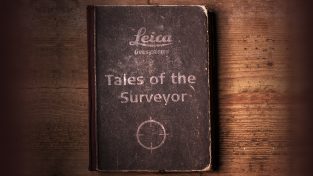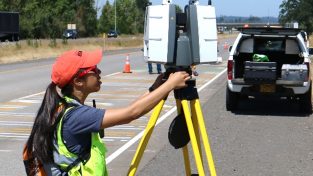Demand for surveying and geospatial engineering services is rapidly outpacing the number of professionals in this field. Developing an inclusive and diverse workforce is essential to closing the gap and elevating the status of the profession. What changes are needed in our firms, educational institutions and the overall industry to achieve this goal? Beth Anne Campbell, president of MidAtlantic Surveying and Land Design and advocate of the Future Surveyors Foundation/Women Surveyors Summit, shares her perspective.
CG: Hello, and welcome to this episode of HxGN Radio. I’m your host, Christine Grahl. In today’s podcast, we’re talking about the need for a skilled and inclusive workforce in surveying and geomatics engineering and the changes we can make in our firms, professional societies, educational programmes, and the overall industry to achieve this goal.
Our guest today is Beth Anne Campbell, who is president of MidAtlantic Surveying and Land Design, as well as an advocate of the Future Surveyors Foundation.
Thank you for speaking with us today, Beth Anne.
BAC: It is very nice to be here. Thank you.
CG: So, Beth Anne, how would you characterise the current state of diversity and inclusion in the surveying profession?
BAC: I would say it’s being talked about, which is a good thing. I don’t think we’re there on a lot of diversity. I find that a lot of the functions I go to, I’m one of the only women in the room, although now there are more women in the room than there were 10 years ago. I think the fact that these conversations are happening is making a huge difference. There’s definitely a push to get younger people of all different colours and genders into the surveying profession. We joke, but it’s really not a joke, that the average age of the surveyor in the United States is in the 60s and 70s, and that is true. And so, what we are trying to do is to encourage and educate a younger community to come into the profession and see what it’s all about.
CG: Tell me a little bit about the Future Surveyors Foundation and your involvement. I know you are part of a group that’s working with the Women Surveyors Summit
BAC: Yes. The Future Surveyors Foundation wasn’t around when I was getting my licence. I’m thrilled that it’s here now. We try very hard to get the younger people in our office into the foundation. One thing we find, and we’re going to talk about this I’m sure throughout today, is just people’s knowledge about surveying and knowledge about what they can or can’t do. I have had several people in my office say, “Well, I can’t go to the Future Surveyors Foundation because I’m not a surveyor yet.” And we laugh and we’re like, “It’s called Future Surveyors.” There’s a reason. So, getting the information out there to people, even if they might be interested, that’s the whole point to get them in.
The same thing with current land surveyors. We have a huge divide in age for them understanding this Future Surveyors Foundation. The whole point is to get young people educated. They may decide they don’t want to become a land surveyor, which is absolutely fine. One more person who’s educated and knows about it, goes to a couple of events online or in person, is one more person who can understand what a land surveyor does.
The Women Surveyors Summit, which I know we’re going to talk about in a little bit, is an offshoot of that as well, just to focus on women in surveying because there’s not many of us. Depending on the state, between 1% and 3% in each state of licenced land surveyors are women.
CG: And have you seen that changing? Are you seeing that changing now with more people coming into the profession with the next generation? Are you seeing more young women and other groups, ethnicities? Are you seeing that change?
BAC: I would say I’m seeing more women. I think as a profession, we really struggle with diversity. You do not see a lot of brown and black people at our events. We are trying to determine why that is happening and trying to get into the schools and really educate anyone who might be interested in surveying.
The thrilling part about the women we’re seeing coming into surveying now, it’s because they want to. And this is ironic because I’m going to explain in a minute how I got into surveying. But not because their dad surveyed, or their uncle surveyed. But we’re seeing women who just find out about it and no one in their family even knew about it, and now, they want to get into surveying. That’s the exciting part because that means there is some outreach that’s happening that’s getting outside of an insular community.
CG: With the Future Surveyors Foundation, can anyone participate in that organisation? I know it’s a non-profit. Is it primarily an organisation that is drawing the women in underrepresented parts of the community? Or would you encourage everyone to participate and take a seat at the table?
BAC: I would encourage everyone to participate and take a seat at the table. The women’s survey portion of the Future Surveyors Foundation does a summit every year. And I’ve had some of the younger men in my office come and say, “Well, can I go?” And I’m like, “Absolutely, sure.” They’re not there to pick up women. Let’s be clear about that. But they want to go because they want to hear that perspective. So, it is definitely very inclusive.
We are very conscious of this not being about male bashing. In fact, I think female surveyors have been very appreciated by our male cohorts. We’re very respectful in our profession. There is no gender bashing. I’m thrilled with that. When I first got involved, I tiptoed in, just read the room, wanted to feel it out. It’s truly about helping bring an underrepresented community into a great profession. It is not about minimising anybody else who’s already in it.
CG: Tell us a little bit about your background.
BAC: I am the one who did fall into surveying. My grandfather was a land surveyor. I grew up very close to him. I lived about a mile away. Never in a million years did I imagine I would become a land surveyor. I have a degree in chemistry. And my uncle is also a land surveyor and engineer. I was home from school one summer and worked for his company, and I met my husband, who was a land surveyor.
After my husband and I were married for several years, the company where he worked got busier and busier, and I started to help out. And before we knew it, we had started our own firm and realised that I could get licenced. I learnt everything by doing. And so, within about five years, I owned our company. I was licenced. And here we are, 16 years later, and I cannot imagine doing anything else.
Company ownership is the most freeing and limiting thing I think you can ever do. You’re always tied to it. I’ve been getting texts. I’m not at my office right now. I’m out of town from my office. And I’ve been getting texts all day, all week, about little things. We’re tied to it, but it’s also wonderful. It has been enriching in so many ways. And especially as a woman in a male-dominated profession, I’ve realised the different perspective you get from working with mostly men. And I find that most of the time, with the men that I work with, they appreciate my perspective as much as I appreciate theirs.
CG: Have you had to push harder to establish your credibility, especially when working with different clients?
BAC: Yes. Again, I will say, with other professional land surveyors, once we meet in the field, we’ll have issues on boundaries where I’m doing a boundary and there’s another surveyor doing a boundary next door or around the corner, and we’ll call each other, and we’ll meet in the field. And once we meet in the field and we’re doing our work, I find that there is… I have had very, very few other land surveyors who I felt that view me differently as a woman. Once we’re in the field doing our work, we’re surveyors, we’re doing our jobs. We get each other.
Where I have found the need to lean in and feel the need to prove myself is either with clients or subcontractors that we use. One of the hardest things I’ve had to deal with is that my husband and I work together, and that part is wonderful. But clients, when we are meeting with clients, they will immediately defer to him. And it’s fascinating because he’ll look at me and say, “I don’t know. Ask Beth Anne.” But that happens. Even 15 years in, we still have that happen.
I’ve learnt that I don’t need to prove myself. I just need to do my job. And I find that once I got that mentality, I removed that chip from my shoulder and said, “I’m just here to do my job,” I find that (a) for me, it’s much easier because then I’m focused on my job. And (b) the clients come around for the most part. There will always be some, but that’s true for anything. Some of it just has to do with the personality of some of the professions we deal with.
But overall, I find that the proof is in the pudding. And as long as I show up and I do my job… And that’s what I encourage the people in my office to do as well. We have a lot of females in our office, and they do great work. It hurts me sometimes when they come to me and share some of the things they’re dealing with because they’re young and so idealistic. I think the world they’ve been raised in… I think, for me, being raised when I was, I was aware that I might have to fight a little harder. I don’t think this generation is as aware of it. I don’t think they’ve experienced it as much, which is great. But now that they’re coming into a world where they’re working with older people and people from very different worlds, they’re experiencing it. And I just keep telling them, “Do your job and do it well. If you don’t know something, ask and admit it. And just keep showing up.” And I find more and more that this works.
CG: One of the reasons this has traditionally been a very male-dominated field is because of the nature of the work. In the past, you had to haul very heavy equipment out in very unpleasant field conditions. And some of that work still has to be done. Some of the equipment is still heavy. But a lot of the dynamic of the work has changed. And so, much of the fieldwork is maybe less intense, and now, more of the work is being done in the office. And so, I wonder if you’re seeing a change in the type of people coming into the profession because of that at all.
BAC: Absolutely. I’m from Virginia. And the State of Virginia right now does not have a four-year programme in land surveying. We have several community college certificates, which are fantastic. But we haven’t had a lot of luck hiring out of Virginia because of that, because the educational opportunities are limited. So out of desperation, we started looking elsewhere, and it turned out to be the best thing that could have happened. We are finding that because the nature of the work has changed, a lot of people love… We have a scanner, for instance. We have the RTC360. And we have been able to attract a lot of people who are just fascinated by it. They come in thinking they’re going to play video games all day because it looks like a video game. And they realise quickly, it’s not. However, they enjoy it.
Even in the field, running the scanner in the field. Our field crews that were very old-school and fought it. They didn’t want it. I think they thought they were going to get replaced. And now they love it because (a) it makes their job easier in some respects. It reduces the amount of time they’re out on that hot pavement doing a topo of a parking lot. It also gives them the time to do the real work. And when I say the real work, I’m not minimising topography. But the real land surveying work, the boundary work, getting in there. It gives them more time to go in and do that. And we have found, overall, whether we’re getting new employees in or older old-school, for lack of a better word, employees, they’ve all really embraced the technology.
The other thing it’s enabled us to do is attract from a very different pool of employees. We have teachers who have decided that teaching is not for them anymore. And they’ve come over to us because they’re not as intimidated by it. I think the fact… the ease of use. From a day-one standpoint, you can come in and feel like you actually did something. You just didn’t stand around and watch all day. And then as they get into it, it just draws them in more and more and more.
And on the inside part, the same. I think having the draw of the technology is a great carrot that turns out to be way more than just a carrot. It just enriches what we do. We are finding that we’re getting people who value both the field and the office, and they’re not just there for a paycheck.
CG: Well, it’s great to hear that some of the barriers are being lowered and more people are being drawn into the profession, but there are still some barriers that exist. Where do you see the biggest challenges in drawing more women and minorities and underrepresented groups into the profession?
BAC: I think, overall, land surveying has a problem with getting anyone into the field. And so, the fact that that’s being discussed on a national level is great. There is definitely a national push to educate, to get into the schools, to expose junior high, high school, college, community college, to expose kids that there is a whole profession out there that they’re not being exposed to.
I think the fact that our schools have become so much more aware of diversity and employment, automatically, we have a nice little system in the fact that the schools, they’re not just going to take all the boys and tell the boys, “Hey, you want to become land surveyors.” Now it’s going to be everyone in the school is going to be exposed to that.
I think the biggest thing to draw in underrepresented future employees, people from other professions, I think what it is, is our advocacy, our education. Before I came on this podcast, I was talking with one of my employees. And I asked her, I said, “So what do you think the problem is?” And she said, “The problem is nobody knows what a land surveyor does.” She said, “When I was in high school, I didn’t know what you did.” She happened to be an intern with us. And all of a sudden, it clicked, and she loved it. But she kept emphasising that it wasn’t even an option. She didn’t even understand that it was an option for her. She was being funnelled into engineering, and that’s where everybody expected her to go. And she fought it tooth and nail. She didn’t realise she was fighting it, but she fought it because it wasn’t a good fit for her. And she wishes that somebody had looked at her and said, “Hey, we’ve got this cool profession that is land surveying. You get to use your brain and use it a lot. You get to move your body. You get to do all of these cool, cool things.” And now she’s becoming an advocate.
And it’s so fascinating to see. And I think that’s where we’re going to get women and underrepresented communities into the profession. It’s going to be word of mouth on a national level.
CG: It really sounds like the professionals have to get involved in sharing that message.
BAC: And I will say that’s a challenge. I think that’s one of the biggest challenges facing land surveyors. I feel, in a lot of ways, for the old guys, for lack of a better word, but for the 70-year-old land surveyor who’s done his job and done it excellently his entire life. And now, this technology is there, and it’s overwhelming.
In our community, we’ve had five survey firms close in the last two years. And a lot of the reasons, when I talked to them, they just were overwhelmed by the technology. They didn’t want to learn it. They didn’t want to hire somebody to teach it to them or to even do it for them. They were very resistant to it. And I think that is one of the biggest challenges we face. We have a big split.
It gets a little comical when you go, for example, for me, to a Virginia surveying event. You look around the room and you see everything now, which is great. But it’s also comical because you have your stereotypical land surveyors and then you have this group of people who you wonder why they’re there at first because they don’t belong here because they look different. There’s women. There’s young people. They’re dressed differently. But that’s what’s happening. And I think the divide is hard. I think it’s hard for older-school surveyors to understand and to actually accept that their profession is really changing.
I’m curious to see what’s going to happen in the next 10-to-15 years. And I think that’s where the advocacy now is so critical. We have to get out there. We have to educate. And we have to find a way to draw people into our profession because we’re going to face a huge, huge glut of… We’re going to have 60% of our profession retiring in the next 10 or 15 years. And what we’re trying to do instead of looking at it as a problem, it’s a wonderful opportunity. It’s a wonderful opportunity to bring people in. But it’s got to come from getting out of the office, getting out of the field, getting out of your little box, and actually coming to events, doing things like this podcast, and speaking up for surveyors.
CG: And the reality is there’s a lot of benefit to be gained in diversity.
BAC: Absolutely. Hearing the other perspectives is huge. For me, I’m on the weird end of that in that I hear from men in the room when we have a meeting, and I start chiming in with my opinions because I’m not quiet about them. But nine times out of 10, afterwards, I’ll have somebody come up to me and say, “Hey, I’m really glad you asked that because I didn’t want to ask that.” And so, I found that my presence in the room tends to draw out other questions that some of the men wouldn’t ask. And again, like I said, we have some young men in our office who want to go to the Women Surveyors Summit events because they want to hear, they want to understand, they want to be a part of facilitating change in the office, and I think that is very important.
CG: And we’re talking about diversity in terms of male, female, and underrepresented groups. But also, when you think about the diversity between the ages, when you have older surveyors working with younger surveyors, and getting all of those different perspectives at the table, everyone can grow and learn together. It’s not always the older ones teaching younger ones.
BAC: Agreed. And one thing I will say that we see with the technology, and one thing that we’re so hoping doesn’t get lost, there’s an art to land surveying. It’s not pushing a button and processing data and producing a pretty survey and getting it out the door. That’s huge. But the art is where are the boundary lines? Does that fence matter? Trying to teach some people in my office, they were draughting a physical, and a girl came in and she said, “Well, the fence is in the wrong place.” And I looked at her and I said, “Well, how do you know the fence is in the wrong place? Maybe the boundary is in the wrong place.” And trying to encourage the people in our office. In my community, we have some very well-known surveyors who are slowing down. They’re taking less and less work. So, we’re getting a lot of their work. But we encourage the folks in our office to call them. Like, hey, you’re working in this area of the city. So-and-so worked his whole career in this area. Call him. He will have perspective. And I’m hoping that that’s what employers like myself, we are very much concerned and energised by what the future is going to bring, but trying to educate and support our staff, encouraging them to reach out to these older surveyors. Full disclosure: I’ve had to warn them, they might be a little crusty. They may be a little grumpy. They may appear that they don’t want to talk to you. But once you get them started, you’re going to get more information than you could ever imagine. And I think that’s a bridge that we really need to work on.
CG: Where do you see things going in the next five to 10 years? In a perfect world, we get to that place where we are encouraging diversity and really bringing people to the table and exchanging ideas. What do you think that will do for the profession overall?
BAC: Oh, I think that would be fantastic. I think that’s a wonderful image. And I think it’s very possible. I think one of the advantages of COVID, it made us all look and say, where are we with our community? Sure, we could get on Zoom, and you could talk to anyone around the world. But somehow, it also made us focus on our community and appreciate what it offers us. And I think land surveying, at the end of the day, it is about community. You’re out on the land. People are seeing you doing your work in your community.
I get texts all the time. We were just doing a project in a community where I grew up. And my phone blew up for two weeks. “Beth Anne, I saw your crew. Beth Anne, I saw them here.” And I just think that’s so cool that we have that connection to our community.
And I think as we get more and more people into land surveying and add that diversity, the value of that just goes through the roof because then you have people from all different walks of life recognising a value in it. It’s not just an old, white man’s profession anymore. I can do this. Anyone can do this. And I see that happening. I’m excited about it. We have a lot of discussions about data, and that data is readily available. I have an iPhone with LIDAR on it. Anyone can take my phone, go out, get a point cloud, and get data. We can get online. You can hire a drone to collect data.
Surveyors collect data, but we do so much more than that. And you were talking about the next five or 10 years. I think where our value is as a profession is understanding that data. Where did it come from and what does it mean? And how does your data work with the guy next to you who got data for the site next to you? Does it match up? And if it doesn’t, why not?
I think that’s where the surveying profession is going. Data collection is, overall, a push of a button now. But interpreting the data, deciding what it means, deciding where the boundary lines fit in that data, that’s where the focus of the profession is going.
CG: Fantastic insights.
Thank you so much, Beth Anne. We appreciate your time.
To our listeners, you can learn more about the Future Surveyors Foundation and the Women Surveyors Summit at futuresurveyors.org.
Tune in to more HxGN Radio episodes on iTunes, Spotify, or SoundCloud. Or visit hxgnspotlight.com for more stories from Hexagon. Thank you for listening.
















